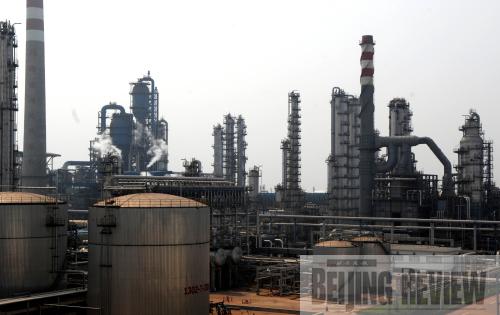|
 |
|
DOUBLE TAKE: Oil refineries like this one in Hainan Province complain about surging crude oil prices and low domestic fuel prices denting their bottom line (JIANG ENYU) |
China imported a total of 200.67 million tons of oil last year to meet insatiable domestic demand, according to figures released by the General Administration of Customs. That means that last year about 51 percent of the domestic oil supply came from international producers. The fluctuations in international crude oil markets thus have a far-reaching impact on Chinese oil markets, forcing domestic refined oil prices to be integrated into global markets. Since December last year, China has adopted a new refined oil pricing mechanism as part of its efforts to bring domestic oil prices in line with international prices.
But judging by the June 30 refined oil price hike, Chinese consumers seem not to have grown accustomed to the new mechanism, since most of them complained. The June 30 hike was the fourth refined oil readjustment since the new pricing mechanism was adopted, including one price reduction and three price hikes.
China is not an oil-lean country in terms of its oil reserves. According to a nationwide oil and gas reserve evaluation conducted by three domestic oil giants since 2000, it has been estimated that China has total oil reserves of 15 billion tons.
Up to now, the country's verified oil reserves are 6.5 billion tons, ranking ninth in the world, after Saudi Arabia, Canada, Iran, Iraq, Kuwait, United Arab Emirates, Venezuela and Russia.
China's refining capacity has been rising in recent years, ranking second in the world after the United States in 2006. Back then China could refine 420 million tons of oil a year, while in 2008 the capacity surmounted 600 million tons.
In spite of this vast processing capacity, crude oil output and refined oil output still cannot meet the ever-rising demand for oil. Driven by rapid domestic economic growth, China's oil consumption has maintained a relatively fast growth rate. From 1979 to 2008, domestic oil consumption grew 5 percent annually on average. In the 10 years from 1994 to 2003 in particular, oil consumption grew 6.4 percent annually on average, making China the second largest oil consumption country in the world in 2003.
In the past 60 years, China has never longed for oil so much as today. When the People's Republic of China was founded in 1949, China lagged behind major powers in terms of oil exploration, drilling, oil extraction, engineering, oilfield construction and oil technology. At that time, the oil industry was still in the recovery and exploration stage. China therefore relied on imports for most of its oil needs, leading to high dependence on imported oil. But the import volume was not big because of limited demand and constrained imports.
In order to change this situation and develop the domestic oil industry, the Chinese Government called for nationwide efforts to build the first oil industrial base—Yumen Oilfield—from 1953 to 1957. In 1957, Gansu Province's Yumen Oilfield had an annual crude oil output capacity of 755,400 tons, accounting for 87 percent of total domestic output. The discovery of Heilongjiang Province's Daqing Oilfield in 1959 signaled the takeoff of the Chinese oil industry. By 1964, China had ended its dependence on overseas oil and become totally self-sufficient.
In 1973, China started to export crude oil to Japan, becoming a net exporter of oil. From 1973 to 1993, the country exported a total of 430 million tons of crude oil.
But rapid economic growth quickly increased domestic oil demand. China remained a net oil exporter for only 20 years before turning into a net oil importer in 1993 with its ever-increasing appetite for oil. At present, China is the third largest oil importer in the world.
In recent years, China has coped with increasing domestic oil demand by building new refineries and expanding old ones, but the crude oil used in the refineries is mostly imported.
After the outbreak of the global financial crisis in 2008, China's demand for oil slipped for once. For instance, net imports of diesel surpassed 2 million tons in both the second and third quarters of 2008, but in the fourth quarter last year China became a net diesel exporter with net exports of 130,000 tons. Crude oil imports also dropped in the fourth quarter, with net imports falling to around 46 million tons, the lowest quarterly import figure in 2008. Moreover, domestic crude oil processing recorded its first year-on-year drop in eight years in the fourth quarter, even though it was a mild 0.1 percent fall.
As the domestic economy begins to recover in the wake of the financial crisis, demand for oil will soar. According to figures released in early June by the China Petroleum and Chemical Industry Association, the refined oil inventories of China National Petroleum Corp. and China Petrochemical Corp. at the end of March were down 14.7 percent compared with those at the end of February. Meanwhile, refined oil sales in March rose 21 percent month on month. Statistics show that crude oil processing in May rose to its highest level in five months. The association said China's demand for oil in the fourth quarter of this year might surpass the amount before the crisis hit the world.
China's demand for oil will remain robust for the foreseeable future. According to the Energy Research Institute under the National Development and Reform Commission, China will need 450 million-610 million tons of oil in 2020, about 60-70 percent of which will be imported. | 